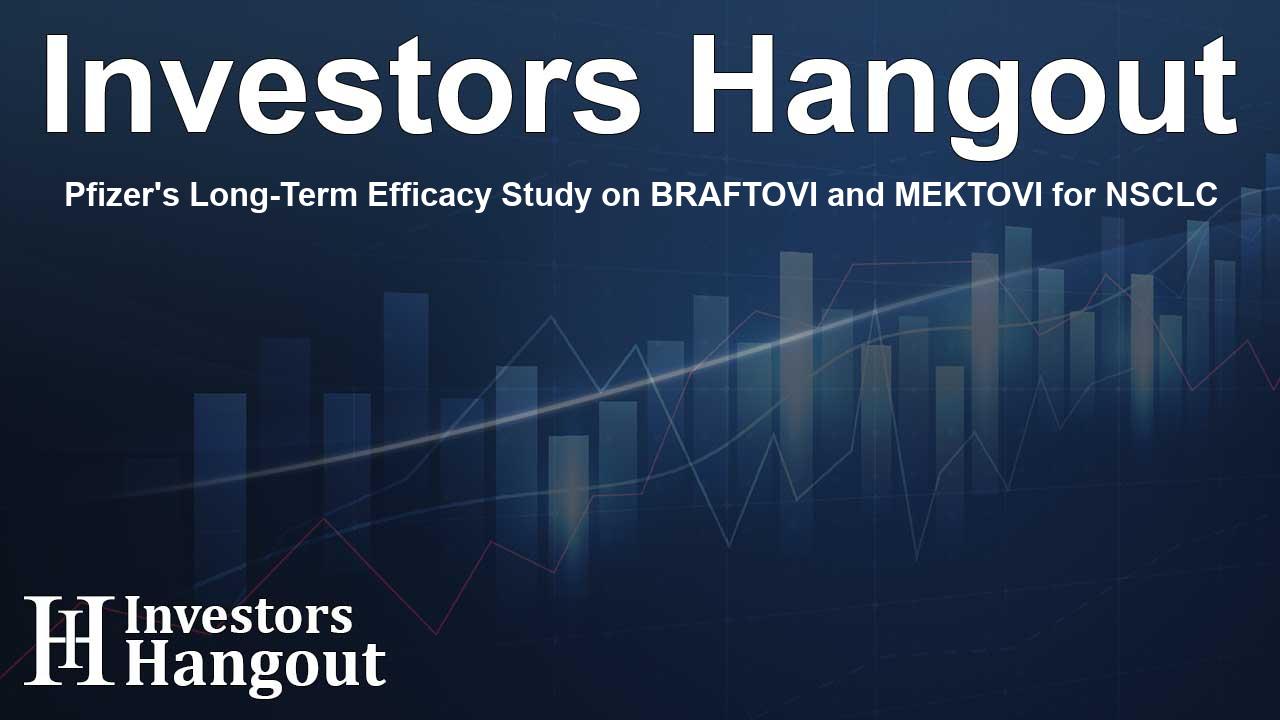Pfizer's Long-Term Efficacy Study on BRAFTOVI and MEKTOVI for NSCLC

Long-Term Efficacy of BRAFTOVI and MEKTOVI in NSCLC Treatment
Recent findings from Pfizer Inc. (NYSE: PFE) shed light on the long-term clinical responses of patients suffering from BRAF V600E-mutant metastatic non-small cell lung cancer (NSCLC). The Phase 2 PHAROS trial aimed to evaluate the safety and efficacy of the combination therapy involving BRAFTOVI (encorafenib) and MEKTOVI (binimetinib). With an extended follow-up period of 18 months, the results indicate a noteworthy objective response rate of 75% among treatment-naïve individuals, with the median duration of response reaching an impressive 40 months.
PHAROS Trial Insights and Patient Impact
The trial also revealed crucial insights regarding previously treated patients, showing an objective response rate of 46% with a median duration of response of 16.7 months. After a follow-up nearing three years for treatment-naïve patients, the data shows a median progression-free survival (PFS) of 30.2 months while the median overall survival (OS) has yet to be reached. These promising results underscore the potential of BRAFTOVI and MEKTOVI as standard treatment options, especially for newly diagnosed patients.
Expert Commentary on Findings
Gregory Riely, M.D., Ph.D., a leading figure in oncological research, emphasized the importance of targeted treatments. He remarked on the aggressive nature of BRAF V600E-mutant NSCLC, noting the critical need for effective first-line therapies with manageable safety profiles. Hence, the longer-term outcomes from the PHAROS trial represent a significant advancement in the treatment landscape.
Understanding NSCLC and BRAF Mutations
Globally, lung cancer remains the leading cause of cancer-related mortality, with NSCLC being responsible for approximately 80-85% of lung cancers encountered. The presence of BRAF V600E mutations, present in about 2% of these cases, adds complexity to treatment strategies. It becomes imperative to investigate the role of targeted therapies such as the BRAFTOVI + MEKTOVI combination.
Trial Methodology and Results
The open-label, single-arm Phase 2 PHAROS trial monitored the effectiveness of the BRAFTOVI and MEKTOVI duo in both treatment-naïve and previously treated patient populations. The trial's outcomes were compelling; previously treated patients exhibited a median PFS of 9.3 months alongside a median OS of 22.7 months, reaffirming the safety and efficacy of this therapy.
Regulatory Approvals and Future Directions
The approval of BRAFTOVI + MEKTOVI by the U.S. Food and Drug Administration in October 2023 marked a pivotal milestone in their clinical journey. Further affirmations are anticipated as the European Commission granted similar approval for the treatment of BRAF V600E-mutant metastatic NSCLC in August 2024. These endorsements open doors to broader access for patients requiring effective treatment alternatives.
Ongoing Investigations and Innovations
Alongside PHAROS, the ongoing Phase 3 BREAKWATER study is examining the combination of BRAFTOVI with cetuximab and FOLFIRI chemotherapy for previously untreated BRAF V600E-mutant metastatic colorectal cancer. This validates Pfizer’s commitment to transforming cancer care through innovative drug development.
Conclusion: The Future of BRAF Inhibition
As our understanding of cancer progresses, BRAF mutations, especially BRAF V600E, are increasingly recognized for their significance in various tumor types, including melanoma and colorectal cancers. Pfizer is additionally advancing a next-generation BRAF inhibitor that targets both mutant BRAF monomers and dimers, aiming for enhanced treatment efficacy. The company's legacy in oncology continues to evolve, with an unwavering focus on developing cutting-edge therapies that improve patient outcomes.
Frequently Asked Questions
What are the main findings of the PHAROS trial?
The PHAROS trial demonstrated a 75% objective response rate in treatment-naïve patients, with median durations of response reaching 40 months.
What does BRAFTOVI and MEKTOVI treat?
BRAFTOVI and MEKTOVI are designed for treating patients with BRAF V600E-mutant metastatic non-small cell lung cancer (NSCLC).
When were BRAFTOVI and MEKTOVI approved?
BRAFTOVI + MEKTOVI received FDA approval in October 2023 and was approved by the European Commission in August 2024.
What safety concerns are associated with BRAFTOVI and MEKTOVI?
Common treatment-related adverse events include nausea, diarrhea, and fatigue, with detailed monitoring advised during treatment.
What is Pfizer's role in oncology?
Pfizer is committed to advancing cancer care through innovative treatment solutions and a robust pipeline targeting various cancers, including NSCLC.
About The Author
Contact Addison Perry privately here. Or send an email with ATTN: Addison Perry as the subject to contact@investorshangout.com.
About Investors Hangout
Investors Hangout is a leading online stock forum for financial discussion and learning, offering a wide range of free tools and resources. It draws in traders of all levels, who exchange market knowledge, investigate trading tactics, and keep an eye on industry developments in real time. Featuring financial articles, stock message boards, quotes, charts, company profiles, and live news updates. Through cooperative learning and a wealth of informational resources, it helps users from novices creating their first portfolios to experts honing their techniques. Join Investors Hangout today: https://investorshangout.com/
The content of this article is based on factual, publicly available information and does not represent legal, financial, or investment advice. Investors Hangout does not offer financial advice, and the author is not a licensed financial advisor. Consult a qualified advisor before making any financial or investment decisions based on this article. This article should not be considered advice to purchase, sell, or hold any securities or other investments. If any of the material provided here is inaccurate, please contact us for corrections.
